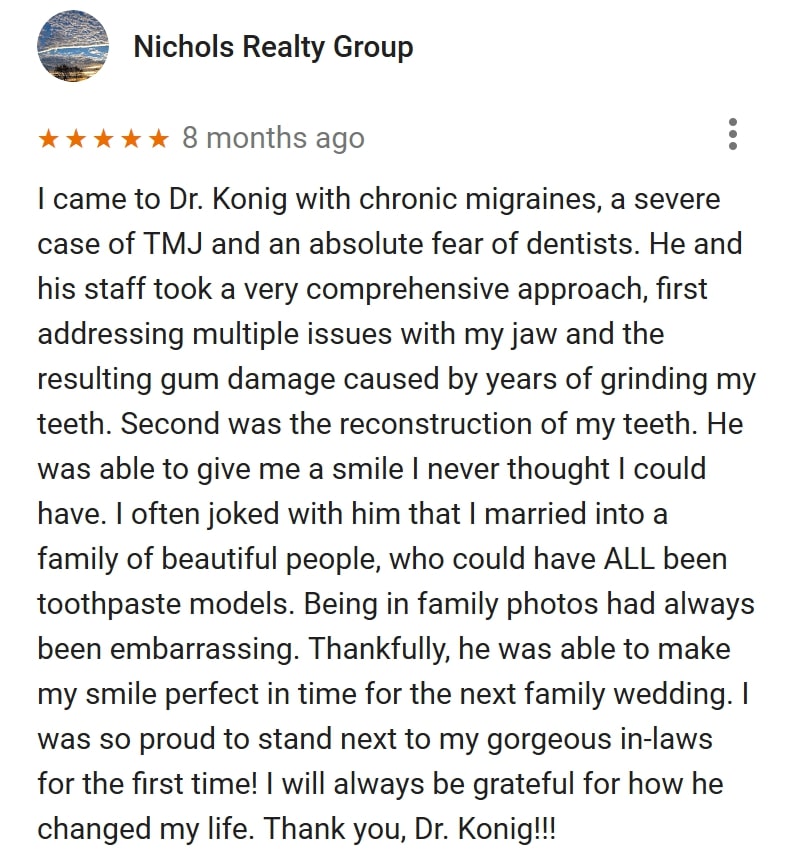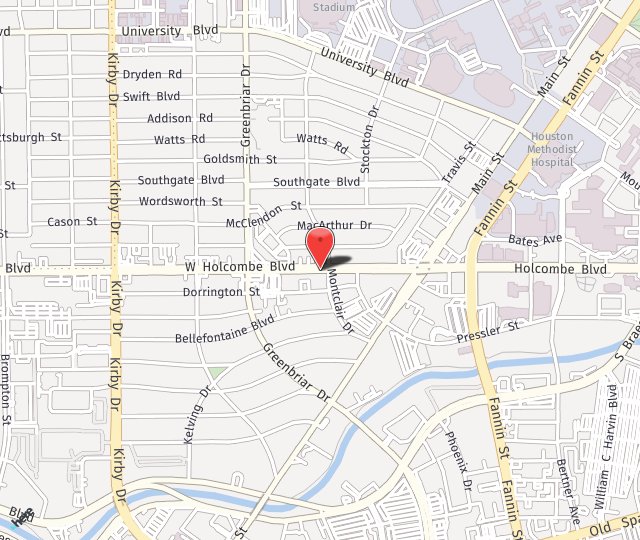TMJ Disorder: Treatment for Headaches, Joint Pain & Jaw Popping
It may sound complicated, but it is really quite simple. If the bite is incorrect, even if the smile looks attractive, trouble is not far behind.
Neuromuscular dentistry for TMJ treatment or Physiologic Dentistry is the art and science of using the relaxed position of the muscles of the head and neck to place the jaw into an optimal physiologic position. Twenty-five years of research and clinical experience have shown this technique to be effective in treating patients with various levels of head and neck pain. It is also used in finding the optimal jaw position before restorative dentistry and greatly increases the longevity of restorations and natural dentition. Whenever the jaw joint, also known as the temporomandibular joint, is misaligned and causing problems, the condition is known as TMJ.
To find out how our dentist, Dr. Ronald W. Konig, can help you with neuromuscular dentistry care, please call us at 713-668-2289 . Our office serves Houston, TX and the surrounding areas.
"I have suffered headaches for so long and have been to numerous TMJ specialists and Dr. Konig is the first one to actually help me! Ive always known my lower jaw needed to come forward but no one else (orthodontist, tmj specialist) agreed. Since Dr. Konig helped move my lower jaw forward I am pain free!!!!!!!!"
TMJ FAQs
What is TMJ?
The temporomandibular joint (TMJ), which connects your jaw to your skull, is one of the most complex joints in your body. It utilizes both a hinge action and sliding motions to enable your jaw to move up and down and side to side. Your lower jaw has rounded ends that move in and out of the joint socket when you perform routine functions such as talking, chewing and yawning. Cartilage covers the bones of the joint, and shock-absorbing disks separate the joint’s ball and socket to ensure that all movements are smooth.
However, when this joint is out of alignment, you can suffer debilitating pain, discomfort, and a loss of function.
TMJ disorders (TMD) can become quite debilitating. There are several symptoms involved with TMD and it's important to have the correct diagnosis before beginning any medication or treatment. Dr. Konig can help determine the cause of your TMJ pain and offer the most advanced and comprehensive treatments available.
How Common is TMJ?
Temporomandibular joint dysfunction (TMD), also referred to as Myofascial Pain Dysfunction (MPD) or temporomandibular joint syndrome (TMJ). This is a chronic illness that affects 75 million people at any one time. There are many people who have no pain but still have an occlusal disease (misaligned bite). Worn, chipped or broken teeth, broken fillings, changing position or shape of the smile are all indications that can benefit from treatment.
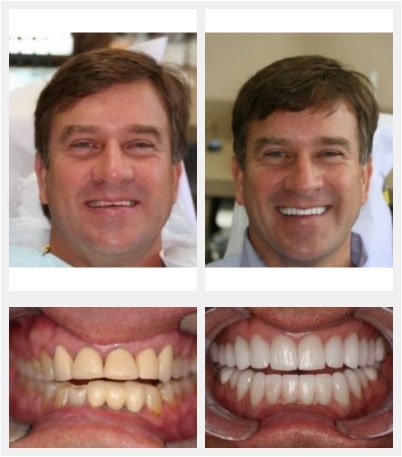
What Can Cause TMJ?
Due to the complexity of the TMJ, it is often difficult to determine the exact cause. The condition can develop from an injury to the jaw, TMJ, head muscles or neck muscles. Often, these injuries are caused by a jarring blow or whiplash.
Other possible causes of TMD include:
- Misaligned teeth
- Pressure on the TMJ caused by grinding or clenching your teeth
- Dislocation of the disk separating the ball and socket of the TMJ
- Damage to the cartilage of the TMJ caused by arthritis
- Stress which may result in a tightening of the facial and jaw muscles
- Allergies and breathing problems
- Missing teeth
TMJ Symptoms
TMD can be extremely painful. While this pain may be short-lived, it is possible for it to become chronic, lasting for many years and causing degenerative problems if left untreated. Common TMJ symptoms include:
- Jaw pain
- Ear pain
- Difficulty chewing
- Tinnitus
- Facial pain
- Locking of the jaw
- Headaches
- Uneven bite
- Clicking, popping or grating sound in the jaw joint when opening your mouth or chewing
- Limited mobility in the mouth
- Uncomfortable bite
- Facial swelling
- Toothaches – a dull ache that affects several teeth in a concentrated area
- Neck pain
- Dizziness
- Numbness and tingling
Worn teeth are not normal, but can be a common symptom of TMJ. As a result of TMD, you may suffer from cracked, loose, missing, chipped or broken teeth.
Are Your Headaches Linked to TMJ?
Not every type of headache is related to the temporomandibular joints, and some headaches have no identifiable cause, which can make searching for headache and migraine treatment difficult. Most headaches fall into one of three categories:
- Primary headaches including tension, migraine and cluster headaches
- Secondary headaches are a sign of other conditions like meningitis, encephalitis, brain tumors or brain injuries
- Cranial neuralgias, facial pain, and other headaches
How Does TMJ Cause Headaches?
These headaches are caused because the temporomandibular joint is out of alignment, which leads to tension in your muscles and can cause headaches.
How to Diagnose TMJ
The diagnosis process involves using a sophisticated computerized calculation to record and interpret temporomandibular joint (TMJ) sounds, masticatory (chewing) muscle activity (EMGS) and the path of movement the jaw follows in function. This information allows us to find the most relaxed physiologic position for the jaw and combined with tomography (specialized jaw joint X-ray) helps determine the best bite for comfort and aesthetics.
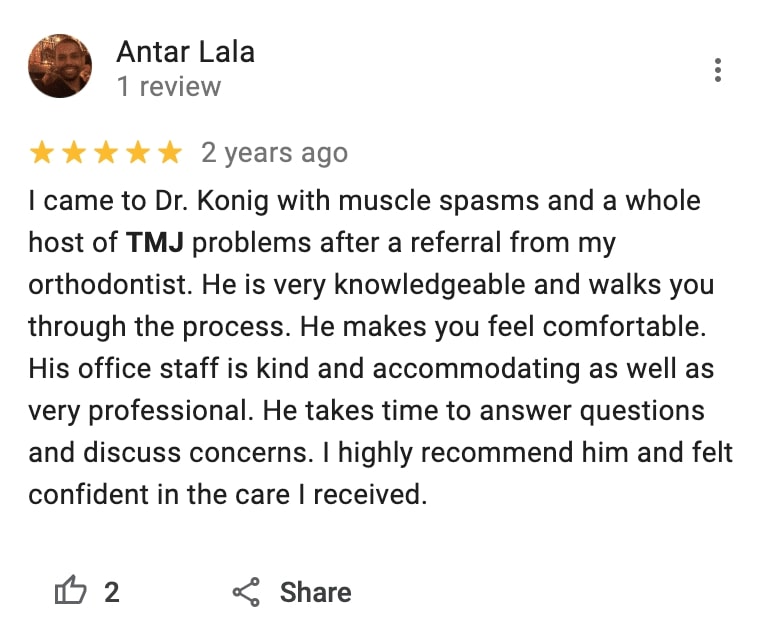
What are the TMJ Treatment Options?
Phase 1: Treating Your Pain
After your diagnosis, Dr. Konig will help you identify which TMJ treatments may work best for you. The initial portion of your treatment plan focuses on stopping your pain. Our office offers these pain relief options:
- Ultra Low-Frequency TENS. This form of TMJ therapy is used to relax your head and neck muscles while measuring the activity and movement of your TMJ muscles and jaw.
- Iontophoresis. Used for pain reduction, Iontophoresis involves using an electric current to transfer pain-alleviating medications through your skin. This treatment offers the advantage of delivering higher dosages of pain medicine with less detrimental side effects.
- Moist Heat. You can use a moist, warm towel or wrap a damp cloth around a heating pad in order to induce muscular relaxation.
- Myofunctional Therapy. This muscle therapy re-trains your tongue and corrects your swallow.
- Pharmacologic Agents. Analgesia or anti-inflammatory medications can often reduce or eliminate your TMJ pain.
- Physical Therapy. Dr. Konig can teach you muscle exercises to reduce the stress on your jaw and increase your range of motion. This can involve functional exercises to support opposing muscle groups as well.
- Pain Release Splint (PRS). Splint therapy for TMJ Disorder helps cushion your TMJ. PRS allows your ligaments and muscles to relax or loosen which can lessen your pain.
- Neuromuscular Oral Orthotic. A clear, hard plastic mouth guard that fits on your lower teeth and situates your jaw in the ideal position to function properly.
- Cervical Therapy. This TMJ treatment therapy can relieve the pain located in your neck that often comes with TMD.
Phase 2: Correcting Your TMJ Movement & Function
Once your pain is under control, Dr. Konig will then focus on the culprit behind the problem. Fixing the underlying cause is a vital aspect of your treatment plan. Our office in Houston offers these treatments to improve the function of your jaw:
- Occlusal equilibration. This treatment will help even your bite and relieve the physical stress on your muscles.
- Implant Dentistry. Prosthetic crowns and bridges can help even your bite and replace missing teeth. Dental implants can also strengthen and heighten your teeth — this can stop the stress on your jaw that leads to pain.
- Orthopedic Appliances. An orthopedic repositioning appliance or oral orthotic are also available options. These are worn long-term on top of your natural teeth and allow muscles to reach a relaxed position.
- Orthodontics. This includes traditional braces or Invisalign® to move your teeth into their desired position and alleviate your pain while giving you straight, healthy teeth.
Why Choosing Dr. Konig Can Change Your Life!
If you have been experiencing some of the above-mentioned symptoms and believe that you may be suffering from TMD, our neuromuscular dentist can help you get the relief you need. Dr. Konig has extensive experience in the field of neuromuscular dentistry, which focuses on making sure the jaw is in proper alignment.
Dr. Konig has attended the Las Vegas Institute for Advanced Dental Studies (LVI) to continue his dental training and learn all about the TMJ and neuromuscular dentistry. When performing your procedure, Dr. Konig will make sure that your bite remains healthy, preventing you from suffering from future TMD problems.
Patient Testimonial
"Shout out to Ron Konig for helping "center" me again and helping me resolve my TMJ issues. I'm no longer "popping" and annoying the family at mealtime. Norma Brown, thank you as well. While I wasn't a fan of the "gizmo," you made my visits so much better with laughter and that blanket! Dr. Konig, you are the best of the best!"
Recent Awards
- Dr. Konig was awarded Best TMJ Dentist Readers Choice Award by Living Magazine in Houston
- Dr. Konig was also named Houston's Top Dentist in the Houstonia magazine
- Texas Super Dentists 2021
- Houstonia Best Dentists
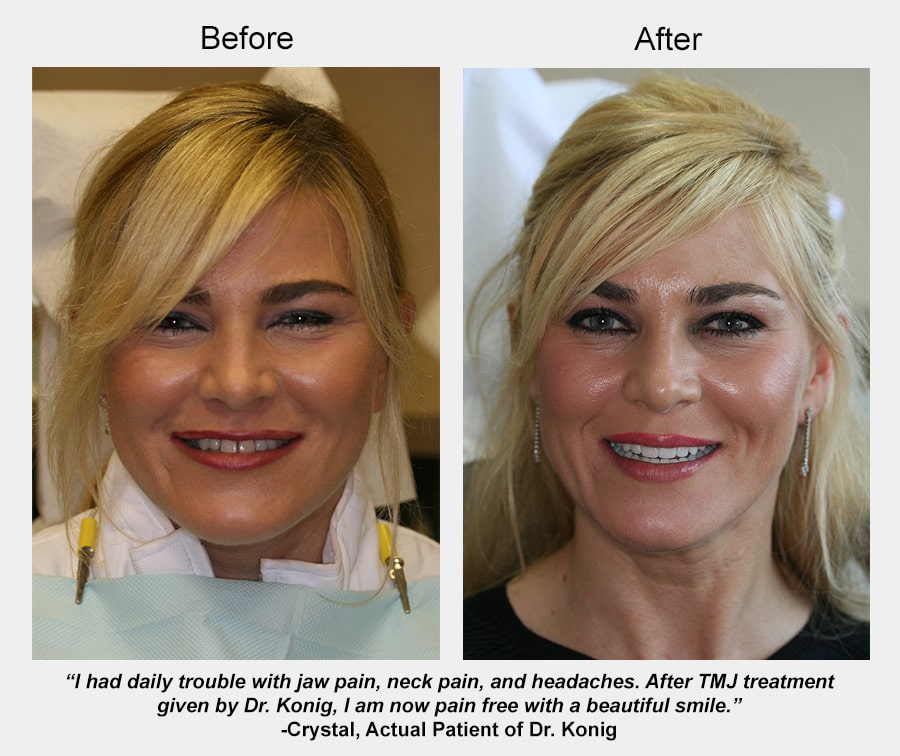
TMJ FAQs
Is TMJ covered under medical or dental Insurance?
TMJ is considered under medical insurance. Very sadly, medical insurance tries to exclude coverage. For some reason it is the only joint in the body that is not often covered. It is an orthopedic issue. Our office certainly helps complete all forms and medical codes to help patients obtain some coverage
If I am having jaw pain and I already have an appointment to meet with Dr. Konig, what can I do to help relieve the pain in the interim?
Please see Dr. Konig’s blog that pertains to this question
What Type of Headaches Can TMJ Cause?
Of these types, the headaches that may be caused by a TMJ disorder are:
- Tension headache
- Sinus headache
- Migraine-like headache
- Cranial neuralgias and facial pain
Primary headaches are the most common headaches, affecting more than 90 percent of the population. TMJ can often cause, trigger or worsen primary headaches.
Tension headaches, the most common form of primary headaches, are often related to TMJ disorders.
Are Your Arms Being Affected by TMJ?
If you have headaches, tooth pain, ringing in the ears, or other symptoms of TMJ, the disorder may also be the cause of your numbness or tingling in the arms. If your jaw is out of alignment as part of TMJ, your body attempts to compensate in other ways, which can lead to subsidiary effects. If your jaw is rolled so that it is higher on one side, for example, your body will compensate by tilting the shoulder the opposite way. Sometimes this is either inadequate or overcompensating, and your body may also respond by tilting your hips. This can create muscle tension and pinched nerves over the entire length of the spinal column.
The nerves that bring impulses between your arms and the brain exit the spinal column at the bottom of the neck. They pass between your collarbone and your top rib and weave between the scalene muscles of your shoulder on their way out to your arms. When your shoulder is tilted in response to TMJ, it creates spasms and tension in the scalene muscles in your shoulder, which in turn can pinch these nerves, leading to numbness or weakness in the hand or arm.
What Are The Odds That TMJ Treatment Is Going to Get Me Out of Pain?
While there are no guarantees that TMJ treatment will eliminate all of your pain issues, you should expect some relief from headaches, jaw pain, neck issues, etc. Even 75% pain relief would be significant if you have been suffering from TMJ and have been trying to manage your symptoms alone.
Can an Earache be a TMJ Symptom?
Yes, ear pain, ringing in the ears (tinnitus), and loss of hearing can be attributed to MJ due to compression of the joints into the ear canal. This can often be caused by clenching or grinding of the teeth and/or bite-related issues.
What Foods Should I Avoid if I Have TMJ?
Chewing gum, eating hard, chewy, crunchy foods, resting your hand on your chin, try to stop clenching your teeth, try to chew on both sides, stop slouching, don't open wide.
Contact our Houston, TX office today to get started!
If you’re concerned you may have a temporomandibular joint disorder, contact our Houston area TMJ dentist today at 713-668-2289 to schedule your initial consultation with Dr. Konig. We happily welcome patients from Sugar Land, Katy, The Woodlands and nearby areas of Houston, Texas.

